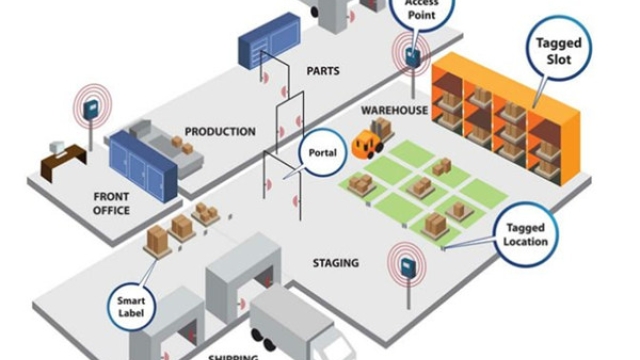RFID technology has revolutionized the way we track and manage objects, providing a level of efficiency and convenience that was once unimaginable. From retail and logistics to healthcare and supply chain management, RFID (Radio Frequency Identification) systems have become an integral part of our everyday lives. By using radio waves to automatically identify and track objects tagged with unique identifying codes, RFID technology has unlocked a range of possibilities for industries across the globe. Let’s delve into the fascinating world of RFID and explore how it is reshaping our present and unlocking the potential of our future.
###1. How RFID Technology Works###
RFID technology, short for Radio Frequency Identification, is a wireless system that enables the tracking and identification of objects using radio waves. It consists of three primary components: a tag, a reader, and a computer system.
The tag, a small electronic device, contains a microchip capable of storing and transmitting data, and an antenna for communication. When exposed to a radio signal emitted by the reader, the tag receives power, allowing it to send back the stored information.
The reader, on the other hand, sends out radio signals and is responsible for collecting data from nearby tags. Essentially, it uses radio waves to activate and communicate with the tags, enabling the exchange of information such as product details, location, temperature, and any other relevant data.
Once the reader captures the transmitted data from the tag, it then transfers the information to a computer system for processing. The computer system, equipped with specialized software, interprets the received data, allowing users to track and manage assets in real-time. This technology has proven to be highly valuable in various industries, including retail, transportation, healthcare, and logistics.
In summary, RFID technology operates by utilizing radio waves to enable communication between tags and readers. By doing so, it provides a seamless and efficient way to track and identify items, offering immense potential for improving processes and productivity across different sectors.
2. Applications of RFID Technology
In recent years, RFID technology has been widely adopted across various industries, revolutionizing the way businesses operate and enhancing efficiency in countless processes. Let’s delve into some of the innovative applications where RFID technology has proven its worth.
Supply Chain Management:
RFID technology has greatly streamlined supply chain management by providing real-time visibility into the movement of goods. By tagging and tracking items throughout the entire supply chain, companies can accurately monitor inventory levels, minimize errors, and automate the replenishment process. This not only reduces costs but also ensures timely delivery and improves customer satisfaction.Retail Industry:
RFID technology has made significant advancements in the retail industry, offering benefits such as inventory management, loss prevention, and enhanced customer experiences. With RFID tags attached to each product, retailers can effortlessly keep track of stock levels and locate items quickly, leading to efficient restocking and preventing out-of-stock situations. Additionally, RFID-enabled anti-theft systems can detect unauthorized removal of tagged items, reducing theft and improving security.Healthcare:
In the healthcare sector, RFID technology has transformed patient care and safety. RFID wristbands and tags can be used to accurately identify patients, track their movement within medical facilities, and ensure that they receive the correct treatments and medications. This helps prevent errors and enhances patient safety, ultimately saving lives. Furthermore, RFID technology has enabled the efficient management of medical equipment and supplies, optimizing the workflow of healthcare professionals.
These are just a few examples of the remarkable applications of RFID technology. As it continues to evolve, we can expect to see even more innovative uses that will shape the future of various industries.
3. Challenges and Future Opportunities
Integration and Compatibility
One of the major challenges faced with RFID technology is its integration and compatibility with existing systems. Many organizations already have established systems and processes in place, and incorporating RFID technology into these systems can often be a complex and time-consuming task. Ensuring seamless integration and compatibility is crucial for a smooth adoption of RFID technology.Data Security and Privacy Concerns
As RFID technology becomes more prevalent, concerns regarding data security and privacy are on the rise. RFID tags transmit data wirelessly, which opens up the potential for unauthorized access and data breaches. Safeguarding sensitive information and ensuring the privacy of individuals is of utmost importance in the widespread adoption of RFID technology. Stricter security measures and encryption protocols need to be implemented to address these concerns adequately.Cost and Scalability
Another challenge that RFID technology faces is the cost associated with its implementation and scalability. RFID tags, readers, and software can be expensive, especially when considering large-scale deployments. This cost can be a deterrent for many organizations, particularly smaller ones with limited budgets. Additionally, ensuring that the technology can scale effectively to accommodate increasing demands and larger volumes of data is crucial for its long-term viability.
RFID solutions Malta
Despite these challenges, RFID technology holds tremendous future opportunities in various industries. With continuous advancements in technology and narrowing of the digital divide, the potential for RFID technology to revolutionize supply chain management, inventory tracking, and asset monitoring remains significant. Furthermore, the deployment of RFID technology in healthcare, retail, transportation, and many other sectors can enhance operational efficiency, improve customer experience, and drive innovation.
In conclusion, addressing the integration challenges, data security and privacy concerns, as well as the scalability and cost-related issues, will be crucial in unlocking the full potential of RFID technology. By overcoming these obstacles and embracing the opportunities it presents, organizations can harness the power of RFID technology to drive productivity, efficiency, and innovation in the years to come.
